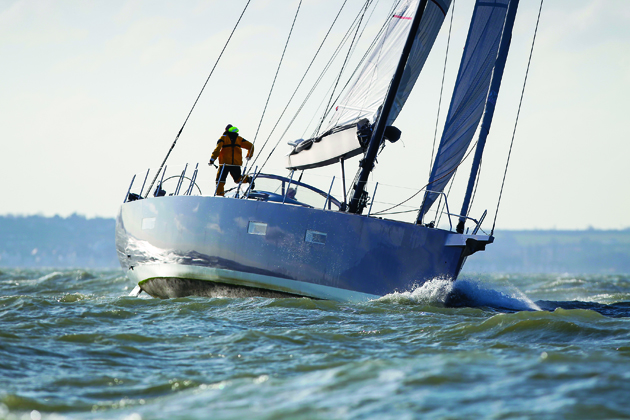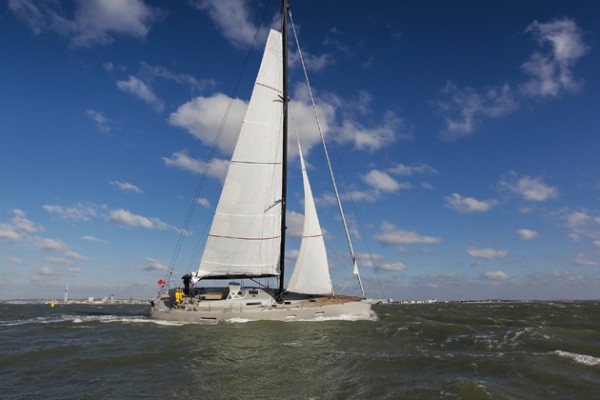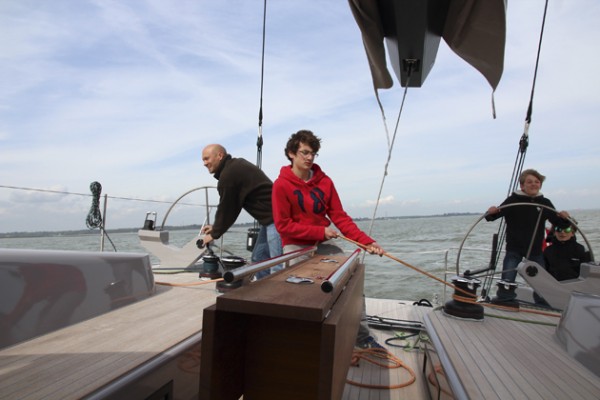A sunny winter’s sail
Gosport was spoiling us that day with a beautifully sunny winter’s morning, but the north-easterly gusts already had some bite. I convinced Philippe Penichou that we should get out sailing, but soon saw why he was questioning my ‘quick morning sail’.
I had presumed that, because this is a boat built for a couple and a family to sail, it would be easy to manage. She is rigged more like a cruiser-racer, however. It’s not a case of standing at the helm, pushing buttons and watching sails unfurl. The main is in a stackpack on a very high boom and the halyard winch is at the mast base.
Moreover, this is a large, powerful boat. From out of the stackpack appeared something that looked as if it belonged on an IMOCA 60: a big square-top, fully battened mainsail. Hence the mainsheet needed easing quickly when the first 25-knot gusts barrelled through. Thankfully, having pushbutton control at the helm for this hydraulically controlled sheet makes helming and mainsheet trimming practical.
A proper staysail is a rare sight these days, but makes an excellent, manageable aspect to Biphoux’s sailplan. And her twin engines mean it is effortless to keep the yacht head to wind or park her in a breeze. I question the merits of having two props completely exposed, however.
For a yacht that displaces 23 tonnes loaded, Biphoux reacts gracefully to the conditions. She certainly makes you feel special, in aesthetics, comfort and feel. Just taking hold of the titanium wheels communicates a quality fit-out. These are mounted relatively low down, which encourages the helmsman to perch comfortably sitting out on the side deck.
The deck is expertly laid out. I liked the inboard position of the four winches, including those for loading running backstays, to keep crew in the cockpit. One benefit of moving the build to Les Sables was that the local shipwrights are used to working on IMOCA 60s, Penichou explained. He did not want black metallic hardware and they were already familiar with soft strops, T-bones and loop rings.
Unlike many sleek designs like this that may have limited practicality when heeled, Biphoux has quite a comfortable and protected cockpit at sea. The coamings are a respectable height, the benches are long and there is a fixed table. The Penichous are considering adding fixed sprayhood windows.
This is a boat designed for sailors who like to spend time at the wheel. She will be fast and fun for lighter conditions and Philippe Penichou is rightfully cautious to reef her early, like a multihull. “What is cool is to be able to go sailing with my wife and kids in our own 60-footer,” he said with a grin after we docked. “If you’d told me that 15 years ago, I’d never have believed you.”
Master of aluminium
Guy Fillon is a fifth-generation boatbuilder from the Poitou marsh near La Rochelle. In the 19th Century his great grandfather Pouvreau made flat-bottom craft for farmers to use on canals during the winter.
At the end of World War I, Fillon’s grandfather built a canoe. With the addition of a sail, the 32ft Requin raceboat was born, 600 of which sold over 30 years.
“While other shipyards chose plastic in the Sixties, I took the option of aluminium,” says Guy Fillon of his own career in the family business. At the Pouvreau yard, he experimented with how to roll aluminium sheets to build the Philippe Harlé-designed 33ft Romanée cruisers. It was an instant success and Fillon went on to become the largest aluminium boatbuilder in France.
High-profile contracts included Whitbread competitors Neptune, Gauloises III, Charles Heidsieck III and Disque d’Or III. He built Baron Edmond de Rothschild’s 8-metre plus several maxis. In the 1980s he moved to Nice to take over the Universal Yachting shipyard to build shoal-draught aluminium cruisers.
Now 75, Fillon is “half retired,” he says, “but keeping an interest in new projects as long as they are exciting, innovative and I have a natural affinity with the partner.”
Specifications
LOA 18.00m/59ft 1in
LWL 17.54m/57ft 7in
Beam (max) 5.13m/16ft 10in
Draught 2.60m/8ft 6in
Disp (lightship) 20,454kg/45,093lb
Ballast 7,000kg/15,432lb
Sail area (100% foretriangle) 183m2/1,969ft2
Sail area:disp 24.9
Disp:LWL 106
Estimated cost: €1.3 million (£940,000)
Designed by: Gilles Vaton
Built by: Guy Fillon
Conclusion
“I would recommend you have a project manager,” said Philippe Penichou. “That’s what made my life difficult. But I think that is obvious. I didn’t want one at the time because of the extra cost – we couldn’t afford it at that point.”
Penichou revealed that his initial budget was €900,000 including VAT. If he had managed to build a boat of Biphoux’s size and quality for that price, it would have been an impressive achievement. But they ended up overrunning that budget by nearly 45 per cent. That puts Biphoux in a bracket similar to semi-custom yachts built by smaller yards at the luxury end of the market, as well as yachts produced by the big quality brands such as Oyster, Hallberg-Rassy and Contest.
But the pleasure the Penichou family get from being aboard a yacht they created themselves – knowing that every detail, every aspect and the position of every item has been done to their wishes – is hard to quantify. It’s unique, creative and brave. Of course, she may not be to everyone’s taste – indeed I’m not sure if I would want to take my family out on her – but isn’t that the whole point of individual taste?
Biphoux is a hospitable yacht with a luxurious, yet family-friendly feel throughout. Above all she is different.
This is an extract from a feature in the May 2015 issue of Yachting World










